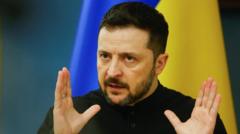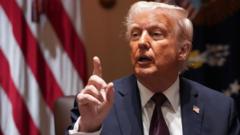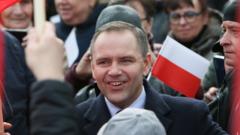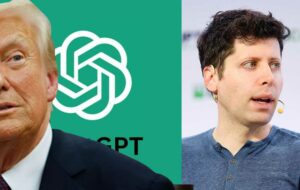As Ukraine seeks a long-term ceasefire, the reliability of U.S. support and Europe's evolving role in the conflict raise significant questions.
**Zelensky's Optimism Amidst European Security Concerns**

**Zelensky's Optimism Amidst European Security Concerns**
Ukrainian President Volodymyr Zelensky discusses security guarantees in Paris while navigating complex international dynamics.
In a recent meeting in Paris with fellow journalists, President Volodymyr Zelensky expressed an upbeat outlook regarding Ukraine's position in the ongoing conflict with Russia. His visit came as he engaged with leaders from a coalition of 30 nations, aimed at solidifying security guarantees for Ukraine amidst discussions of a potential long-term ceasefire. The welcoming atmosphere, marked by the Eiffel Tower illuminated in Ukraine's colors, symbolized solidarity and support from European allies, particularly from French President Emmanuel Macron and UK Prime Minister Sir Keir Starmer.
This warm reception starkly contrasted with Zelensky's previous encounter with U.S. President Donald Trump, where he was met with criticism and left the White House without solidified support. The U.S. had briefly suspended military aid, triggering significant concerns among Ukrainian leaders about the reliability of American backing. Zelensky has since attempted to repair relations by adapting his rhetoric to appease Trump's administration, including a newfound openness to ceasefire negotiations that would not initially hinge on U.S. security guarantees.
Zelensky, while recognizing the reinstatement of U.S. military support, articulated a lingering apprehension within Ukraine about Trump's perceived unpredictability. He remarked on the established view among European leaders that they can no longer exclusively rely on U.S. security commitments, a sentiment underscored by their collaborative efforts to bolster defense spending and address mutual security threats.
During the interview, Zelensky commented on recent Russian demands for a ceasefire, specifically highlighting the Kremlin's insistence on the reintegration of a Russian bank into the SWIFT banking system as a precondition. He called for a strong and unified response from the U.S., hoping to leverage American support as Ukraine staunchly defends its territorial integrity.
The interview also touched upon the growing discontent within the Trump administration regarding European defense spending, with some officials like Steve Witkoff expressing skepticism about the feasibility of European-led initiatives for backing Ukraine. Zelensky rebuffed these narratives, emphasizing the need for Western unity against Russian misinformation and advocating for a more robust European military framework.
Despite the dire circumstances stemming from Russia's aggression, Zelensky conveyed optimism for the future, advocating for a sustained commitment to Ukrainian sovereignty. His ambitions extend beyond the current crisis, as he aims for a peaceful resolution that prioritizes the safety and freedom of Ukrainian citizens, including hopes for his children to live without fear.
As the conflict continues, Zelensky remains focused on the long-term strategy required to secure Ukraine's future, contrasting his resolve with what he perceives as the faltering leadership of Putin. The Ukrainian president’s outlook ultimately symbolizes the broader struggle for security in Europe and the necessity for coherent transatlantic support in the face of escalating geopolitical challenges.
This warm reception starkly contrasted with Zelensky's previous encounter with U.S. President Donald Trump, where he was met with criticism and left the White House without solidified support. The U.S. had briefly suspended military aid, triggering significant concerns among Ukrainian leaders about the reliability of American backing. Zelensky has since attempted to repair relations by adapting his rhetoric to appease Trump's administration, including a newfound openness to ceasefire negotiations that would not initially hinge on U.S. security guarantees.
Zelensky, while recognizing the reinstatement of U.S. military support, articulated a lingering apprehension within Ukraine about Trump's perceived unpredictability. He remarked on the established view among European leaders that they can no longer exclusively rely on U.S. security commitments, a sentiment underscored by their collaborative efforts to bolster defense spending and address mutual security threats.
During the interview, Zelensky commented on recent Russian demands for a ceasefire, specifically highlighting the Kremlin's insistence on the reintegration of a Russian bank into the SWIFT banking system as a precondition. He called for a strong and unified response from the U.S., hoping to leverage American support as Ukraine staunchly defends its territorial integrity.
The interview also touched upon the growing discontent within the Trump administration regarding European defense spending, with some officials like Steve Witkoff expressing skepticism about the feasibility of European-led initiatives for backing Ukraine. Zelensky rebuffed these narratives, emphasizing the need for Western unity against Russian misinformation and advocating for a more robust European military framework.
Despite the dire circumstances stemming from Russia's aggression, Zelensky conveyed optimism for the future, advocating for a sustained commitment to Ukrainian sovereignty. His ambitions extend beyond the current crisis, as he aims for a peaceful resolution that prioritizes the safety and freedom of Ukrainian citizens, including hopes for his children to live without fear.
As the conflict continues, Zelensky remains focused on the long-term strategy required to secure Ukraine's future, contrasting his resolve with what he perceives as the faltering leadership of Putin. The Ukrainian president’s outlook ultimately symbolizes the broader struggle for security in Europe and the necessity for coherent transatlantic support in the face of escalating geopolitical challenges.






















